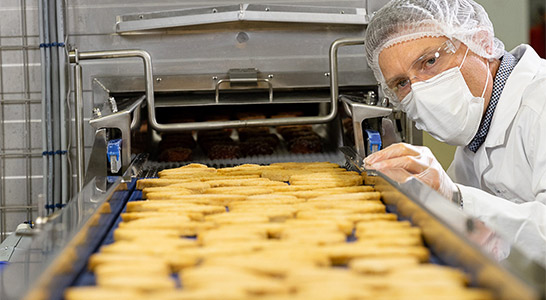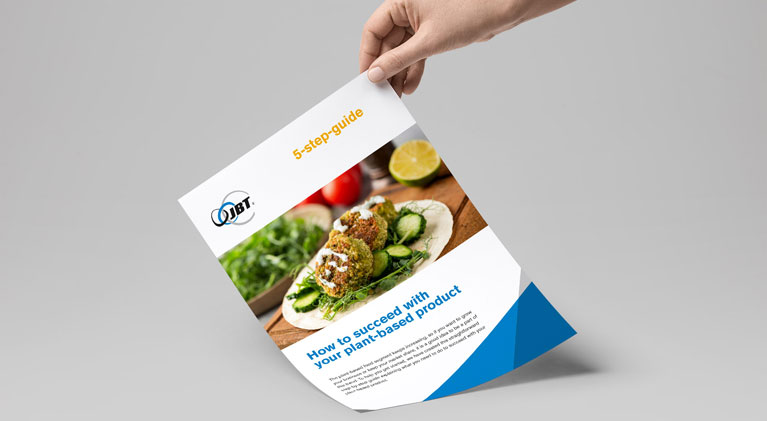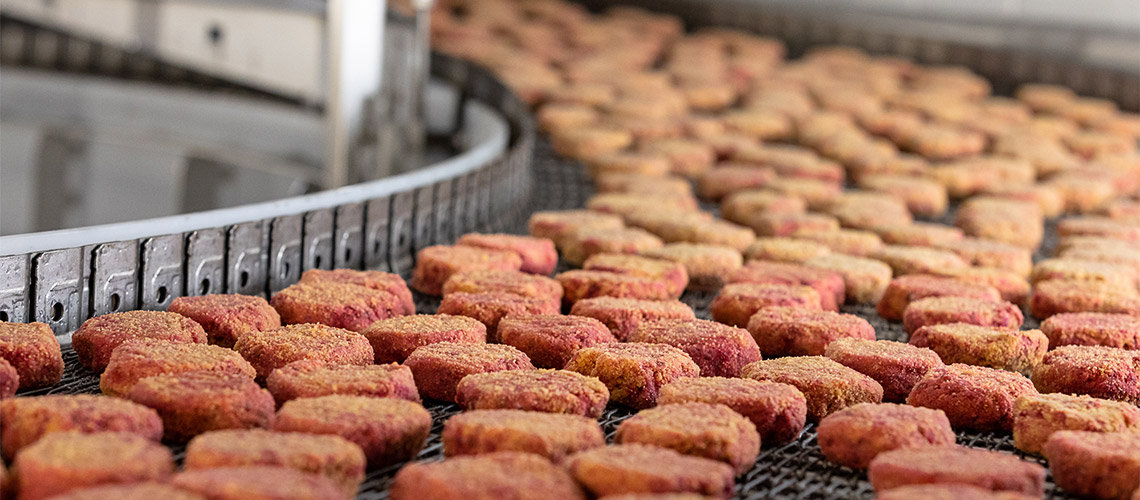More and more food companies that traditionally haven’t processed plant-based proteins are transitioning into the market. In most cases, they don’t set up a new production line in their existing plant. Instead, they buy an existing smaller company or start a subsidiary. In which case, they invest in new modern equipment like freezers. When doing so, it is essential to choose freezing equipment that is both optimal for plant-based products and ready to scale up from batch to line production in the future. At JBT, we have many years of experience providing and developing the right future-proof freezing solution for our customers and their plant-based products. By partnering up with us early in the process, we can help you solve your challenges and help you produce great food. This article gives you tips on freezing a plant-based product and choosing the right equipment.
Starting small and scaling up
Many companies that transition into plant-based production acquires a smaller company already on the market or set up a subsidiary. Doing so is a wise strategy that offers an opportunity to thoroughly test the products and processes and explore the market demand. But when starting small, it’s essential to think big from day one. Because scaling up can be a challenge if the production line you set up isn’t ready for it.
Going from batch production to continuous line production has many pitfalls. It’s a challenge to keep the same taste, handling temperature, cooking times, and settings, as well as a good freezing process. Leveling up is an important step and one that often creates unforeseen problems if not planned from the beginning.
By partnering with us early, we can secure that your process is ready to scale up when that day comes by helping you choose the right equipment. Initially, it sometimes can require a somewhat more significant investment, but in the long run, the better yield and less manual labor that comes from line production will compensate for that. And if your production line isn’t suited for it, scaling up will eventually mean even more significant investments
Setting up a production line for freezing plant-based products

Plant-based protein products tend to have a different heat transfer capability than meat. The cooking process and temperature requirements ensure that the product quality is maintained regardless of whether the end-product is frozen or chilled. Plant-based products are processed to a different temperature than meat-based due to food composition. In addition, it often has many additives, like oil and sugar, and could hold more water.
All of the above are factors that affect the freezing time. Substances like fat, acid, and sugar and the thermal conductivity sometimesmake it slower to chill and freeze. Because of this, it is vital to test the production line to find the optimal freezing process. By analyzing how the product is structured, the amount of fat, water, and carbohydrates, we can help you optimize that process. We always recommend that you do the final testing in the actual production line, so you know that it will be replicable in day-to-day production. You can test much in the lab initially, but it is essential to perfect it in the industrial environment. That’s why our food process- and application specialists are availableto visit your site and help you optimize the process – and continue to do so in the future if your product range or staff changes.
And although the plant-based product itself can cost less than meat, the freezing process can be more complex, and the investment in creating the product more significant. Therefore, it is essential to test to ensure optimized yields with minimized dynamic- and mechanical losses. These factors affects the efficiency and profit you will get out of your process and product.
Food processing equipment for freezing plant-based products
Depending on your plant-based product’s shape and form, you must apply different freezing methods. Fluidization is ideal for small pieces like cubes, strips, and mince. Our Frigoscandia FLoFREEZE IQF freezer with true fluidization has a large capacity and maintains high hygienic quality. It uses a patented airflow system that gently separates delicate products at the crust freezing stage, which is exceptionally well suited for plant-based products that can be stickier. The ability to tune airflow through the product bed ensures gentle optimized fluidization regardless of product shape, size, and weight. It also makes it possible to freeze tiny bits, minimizing food waste.
The Frigoscandia GYRoCOMPACT Spiral freezer with a self-stacking belt has many advantages for more oversized products like filets. For instance, it has the industry’s only self-contained freezing zone that is 100% cleanable, and it can match your freezing and chilling needs precisely with complete customizability.
But which freezer equipment and processing solutions you need depends on many different factors. So, when planning your production line, take advantage of our experience in processing plant-based products. At JBT, we have the knowledge and the range of products to guide you on what freezing methods and equipment are optimal for your product, both now and in the future.

5-step-guide: How to succeed with your plant-based product
- Insights into critical factors for succeeding
- Vital questions that you need to address
- A suggested roadmap from start to finish
Who can benefit from our latest GYRoCOMPACT 70 Freezer
Need help to transition into plant-based?
JBT is a leading global full-solution provider within food processing, offering a broad portfolio of products and solutions. We have a long experience in plant-based protein processing and production, and our food experts are standing by to help you with your transition and guide you on your journey towards successfully growing your business.

